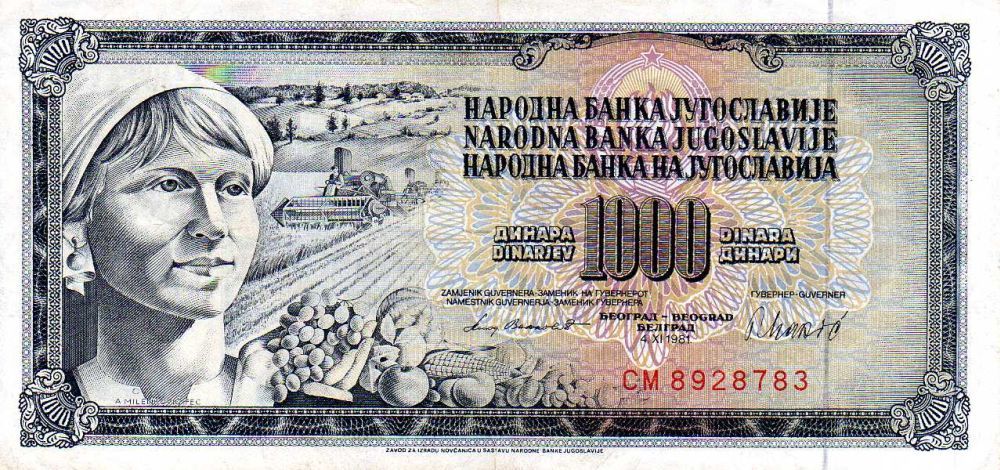News
Nordic Monitor, a Stockholm-based news site that focuses on Turkey, claims to have obtained secret documents which reveal that diplomats working at the Turkish Embassy in Ljubljana collected information on the activities of critics of President Erdoğan in Slovenia, listing their names and profiling their organisations.
According to the report, the groups that were spied on are all believed to be affiliated in some way to Fethullah Gülen, the US-based Muslim cleric who is a prominent Erdoğan critic. The groups the diplomats filed reports on include Ambra, Izobraževanje, Kultura in Turizem d.o.o., an educational and culture organization that was set up in 2005; an intercultural center called Društvo Medkulturni Dialog; and the Ambra Jezikovni Center, which offers language courses in English and Turkish.
Nordic Monitor claims that the collection of data amounts “to refugee spying or unlawful intelligence gathering by embassy and consulate officials,” and goes on to assert that “those who were listed in these embassy documents were often targeted by a campaign of intimidation and harassment and denied consular services abroad, while their relatives and friends back in Turkey risked the possibility of jail time, asset seizure and persecution on fabricated criminal charges.”
The full report can be read here.
STA, 29 April 2019 - One of the two main road links with the Austrian state of Carinthia, the Tržič-Ljubelj road, will be closed for around a month and a half due to rockslide prevention measures, the Infrastructure Agency has announced. An increased volume of traffic is thus expected at the Karavanke motorway tunnel, which will serve as a detour.
The road was closed after a part of it was hit by a minor rockslide on Sunday, exposing the danger of potential future rockslides, including a number of crisis points and gaps.
The precaution works will be carried out in the area of 450 metres along the slope overlooking the road, costing some EUR 1m.
The detour is arranged through the Karavanke tunnel and the Jezersko pass.
STA, 28 April - Forty-seven people died in Slovenia in 2017 of causes related to drug abuse, seven more than in 2016, shows data from the National Institute of Public Health (NIJZ).
Drug-related deaths have been rising since 2013. In 2017, one person who died was a teenager aged 15-19, four were aged 20-24, and as many as 16 were older than 45.
The vast majority of the casualties, or 79%, were men, according to the NIJZ's publication on illegal drugs in Slovenia in 2017 and in the first half of 2018.
The majority of the deaths from 2017 resulted from heroin and cocaine intoxication, 18 and 14, respectively.
As many as seven resulted from other synthetic opioids, and there were eight intentional intoxications, or overdoses.
Marijuana remains the most popular illegal drug
Police processed almost 2,000 criminal acts related to illegal drugs, with cannabis accounting for the majority, followed by cocaine, heroin and amphetamines.
A survey on treatment has shown 211 persons (86.4%) who sought treatment for the first time or re-entered such treatment in 2017 did so due to problems with opioids.
Fifteen persons (6%) cited problems with cannabis as the reason for treatment.
The number of people seeking treatment for cannabis rose in 2017, after falling in 2016 for the first time in several years.
Ever since 2011, cannabis (THC) has been the drug for which patients were most often treated at the Centre for Clinic Toxicology and Pharmacology in Ljubljana.
Meanwhile, results of a survey into drug abuse has shown that 42.5% of all surveyed 17-year-olds have tried cannabis at least once, boys more often than girls.
An online survey on the use of new psychoactive substances has shown that 12% of University of Ljubljana students abuse them.
According to another online survey, carried out by the Slovenian Traffic Safety Agency in 2016, 5% of almost 3,030 persons polled were involved in driving under the influence in the 12 months before the poll, again more men and women.
In 2017, the Ministry of Labour, the Family, Social Affairs and Equal Opportunities earmarked almost 3.3 million euro for various programmes to fight addiction.
Meanwhile, the NIJZ's estimates the country earmarked a total of 10.4 million euro to deal with the issue, including for preventive programmes.
All our stories on marijuana in Slovenia (and it's changing status) and can found here, while those on recreational drugs in general are here
STA, 28 April 2019 - Slovenia is seen as a stable, constructive and pro-European country which however does not fully use the potential it could to play the role a small country can play in the EU, Slovenia's former European Commissioner Janez Potočnik has told the STA ahead of the 15th anniversary of the country's EU accession.
"We don't use to the fullest the role small and less exposed countries can play in the EU and we're also not among those which would attract attention with acts which are not in line with European values."
Since joining the EU on 1 May 2004, Slovenia has achieved a lot of what it had aspired to, and many of these things are now taken for granted, says Potočnik, who now co-chairs the UN International Resource Panel.
As Slovenia's chief negotiator in accession talks with the EU, Potočnik looks back at the process of negotiations with satisfaction.
"The unity we managed to build was genuine and convincing. It wouldn't be realistic to expect something similar now, as the clear goals uniting us are no longer there."
Nevertheless, there are too many disagreements and divisions, says Potočnik, who first served as research commissioner and then as environment commissiner in the 2004-2014 period.
It sometimes seems as if Slovenia artificially creats problems to fuel divisions, which Potočnik says are in the interest of those who do not have enough knowledge and strength to address complex challenges of the times we live in.
While he is happy Slovenians are still well aware of the advantages of EU membership, he is worried that some are too much focussed on the past, which is interpreted to one's liking, which prevents Slovenia to close ranks and take a step forward stronger.
"I miss strategic reflections and more focus on the problems which are really important for our future and on which we should really reach a compromise.
"I'm also worried about the divisions surrounding the migration issues and even whether it is sensible to be part of European organisations."
For him, Slovenia's major challenge, especially with a view to its EU presidency in 2021, is the same as for the EU and the world - a transition to an economically, socially and environmentally sustainable economy.
"This should undoubtedly become the priority of our EU presidency. If it doesn't, we'll send out a message ... that we don't understand what the key challenges of the EU and the world are and that we are a country which does not belong to the core of those in the EU pushing for a transition to the world we want, need and deserve."
The historic Big Bang 2004 expansion of the EU has largely eliminated post-WWII historical divisions in Europe, but also taught us that democratic change does not come with administrative measures and by formally adjusting to EU law, says Potočnik.
"It takes time and hard work to overcome development mistakes from the past and the interests surrounding them. EU membership is an important factor of democratic stabilisation but does not protect us from fully from our own mistakes."
Looking at the prospects of new rounds of enlargement, Potočnik says the EU is currently actually shrinking, while there is little going on enlargement-wise.
He points to Brexit, saying it is a sad event, especially because we live in a time which calls for deepening cooperation.
While he admits there are several reasons for the EU being busy dealing with itself rather than focussing on enlargement, such as migrations, security and bad experiences with some of the countries joining the bloc in 2004, Potočnik says it is still not acceptable Europe's stability depends on the stability of the Balkans.
He believes the recent name change agreement between Greece and North Macedonia should be used to "actively revive the enlargement process".
Also, Slovenia and Croatia should resolve the border issue on the basis of the legally binding arbitration agreement, which he says is a much easier problem to solve than some other issues in the region.
Potočnik also hopes the environment and sustainability in general will come to the forefront of this year's campaigning for the elections to the European Parliament.
Slovenia is dealing with climate change, yet not well enough, he says, adding the issue should have played a more prominent role during the 2018 campaign for Slovenia's general election.
Given that Potočnik has served two terms as European commissioner, his name has come up for the new make-up of the European Commission due later this year.
He says he would think it over if offered the post, but adds that he has not discussed it with Prime Minister Marjan Šarec or anyone else.
All our stories on Brexit are here, while all those on the European Union are here
STA, 28 April 2019 - World champion Loic Bruni from France won Sunday's World Cup mountain biking downhill on Slovenia's Pohorje, which hosted the event after a nine-year break. The women's race was won by Britain's Tahnee Seagrave.
Bruni outperformed Britain's Danny Hart by 0.404 seconds, while Australia's Troy Brosnan finished third.
Slovenia's Jure Žabjek, the best male competitor last season, finished 20th.
He is nevertheless happy with the result, making a comeback after injuries cost him almost all of last season.
"I believe I can climb higher," Žabjek, a member of the Slovenian-Canadian Unior/Devinci Factory Racing team, said after the race.
The women's race was won by Seagrave, with Slovenia's Monika Hrastnik, last year's European champion, finishing fifth.
The World Cup event on Pohorje used to be one of the most popular races of the season. The first race was held 20 years.
The organisers said this was Maribor's largest sporting event in recent years.
The Red Bull Media House estimated around 60 million spectators from around the world would tune in live.
You can see the course below, and if you'd like to mountain bike in Pohorje then check out the Bike Park site here
STA, 28 April 2019 - Vinica, a tiny border town in the south-east, is marking the centenary of a republic (Viniška republika) declared on its territory on 21 April 1919 but repressed only three days later.
Vinica residents got the idea to declare an independent state, the Republic of Vinica, from local survivors of World War I (1914-1918).
The cause for declaring it was problems surrounding the stamping of money, which caused a stir in this village in the Bela Krajina region, prompting secession.
The rebellion was repressed by the police and army of the State of Serbs, Croats and Slovenes, which emerged after the fall of the Austro-Hungarian Empire in late 1918.
President Borut Pahor, the keynote speaker at Saturday's main event, said Slovenians should proudly remember everything that had made them a sovereign nation which cherished the spirit of resistance.
Pointing to the 27 April Resistance Day, he said it was people's resistance that this public holiday and the celebrations of the Vinica Republic centenary had in common.
The people of Vinica had a sincere wish to choose their own representatives, he said, adding that such great ideas deserved admiration.
Pahor noted the Republic of Vinica was one of many events proving the idea of a democratic and sovereign Slovenia had not happened overnight but was a result of efforts of many generations.
As part of five-day centenary celebrations, a screening of a documentary on the Republic of Vinica made in 2012 by public broadcaster RTV Slovenija is scheduled for Tuesday alongside a workshop on Vinica postcards to be held at the house in which writer Oton Župančič (1878-1949), Vinica's most famous resident, was born.
Bookmark this link and find the headlines faster each morning, or follow us on Facebook
A schedule of all the main events involving Slovenia this week can be found here
Visiting Ljubljana? Check out what's on this week, while all our stories on Slovenia, from newest to oldest, are here
This summary is provided by the STA:
Ex-Slovenian EU commissioner says Brexit sad affair
BRUSSELS, Belgium - Slovenia is seen as a stable, constructive and pro-European country which however does not fully use the potential to play the role a small country can play in the EU, Slovenia's former European Commissioner Janez Potočnik told the STA ahead of the 15th anniversary of Slovenia's EU accession. He would also like the country to engage in strategic reflections about its problems and future. He believes Slovenia's major challenge, especially with a view to its EU presidency in 2021, is the same as for the entire EU and the world - a transition to an economically, socially and environmentally sustainable economy. Slovenia's chief negotiator in EU accession talks regrets the EU is shrinking, pointing to Brexit. He believes the country name deal between Greece and North Macedonia should be used to revive the enlargement process.
Report: Nearly 50 drug-related deaths in 2017
LJUBLJANA - 47 people died in Slovenia in 2017 of causes related to drug abuse, seven more than in 2016, shows data from the National Institute of Public Health (NIJZ), which also says that drug-related deaths have been rising since 2013. The vast majority of the 2017 deaths, or 79%, were men, according to the publication on illegal drugs in Slovenia in 2017 and the first half of 2018. The NIJZ's estimates Slovenia's earmarked 10,4 million euro for various programmes dealing with drug addition in 2017.
Ormož eye wear maker increasing production
ORMOŽ - Safilo, the Ormož-based eye wear manufacturer owned by the Italian Safilo Group, returned to sales growth last year following a dip in 2017. The company generated sales of 32 million euro, up 2 million from the year before and 7 million above plans. Profit rose by a tenth to 1.25 million euro.
Protest as locals demand better border protection
JELŠANE - Some 400 locals living along the border near the Jelšane crossing staged a rally demanding better border protection and rejecting the idea of their community hosting a processing centre for migrants. Ivan Cegnar, who heads a local civil initiative that has spearheaded the protests, said the locals demanded that the state protect the Schengen border in line with the law, which would render the processing centre unnecessary.
Pahor says Resistance Day "glorious"
LJUBLJANA - President Borut Pahor described Resistance Day as a "glorious day" that celebrates rebellion against attempts to destroy the Slovenian nation. Rebellious people risked their lives and resisted are patriots who deserve respect and admiration notwithstanding what accompanied the national liberation struggle, he said.
Moody's keeps Slovenia at Baa1, upgrades outlook
LJUBLJANA - Ratings agency Moody's upgraded Slovenia's outlook to stable from positive as it kept its country rating at Baa1. The outlook was changed due to the government effective response to issues exposed by the debt crisis, the Finance Ministry said, adding that it also indicated a forthcoming rating upgrade provided Slovenia implements its policy roadmap.
Final tally shows 103 candidates vying for eight seats in EU parliament
LJUBLJANA - A total of 103 candidates running on 14 lists will vie for eight seats allotted to Slovenia in the European Parliament, shows the final tally by the National Electoral Commission. There will be 51 women on the ballot and 52 men and six lists, including by five parliamentary parties, have made women their top candidates.
Another bouldering competition and another first place finish for Janja Garnbret, as the young Slovene took gold for the third time in the third event of the season in Chongqing, China. She was joined on the podium by Akiyo Noguchi (Japan) in second place, and Austria’s Jessica Pilz. Katija Kadić was the other Slovenian in the top 10, finishing sixth.
Turning to the men’s bouldering, this was won by Manuel Cornu (France), followed by Japan’s Tomoa Narasaki, with Slovenia’s Anže Peharc in third, while Gregor Vezonik was eighth.
The results means that Slovenia remains at the top of the team rankings for bouldering, ahead of Japan and France, while the women’s event is led by Janja Garnbret. With regard to the men’s overall rankings, the Czech Adam Ondra is in the lead, followed by Slovenia’s Jernej Kruder.
April 28, 2019
Money in Slovenia has existed in three different currencies since the country declared independence on June 26, 1991, the last one being the euro, introduced on January 1, 2007.
Before the euro, the Slovenian currency was the tolar.
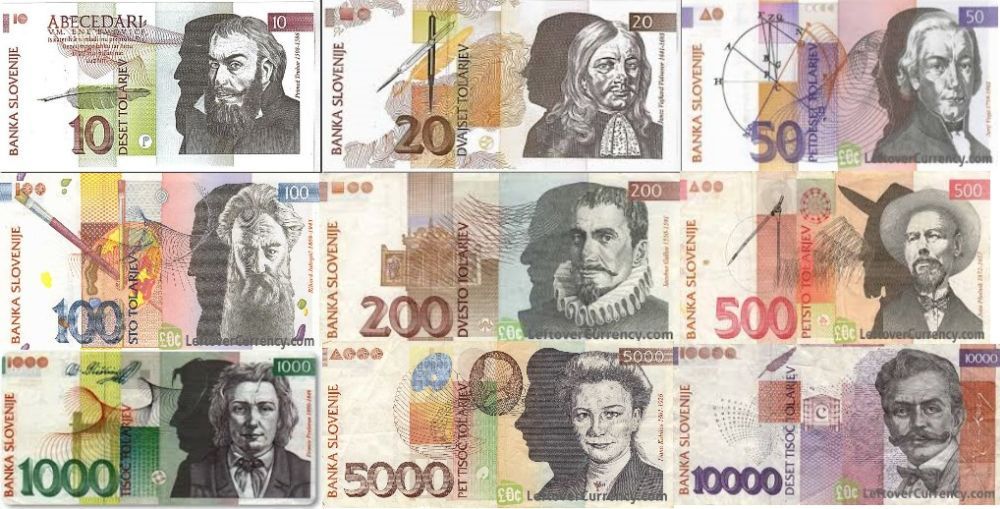
And before the tolar, Slovenia used the Yugoslavian dinar.
The dinar was a troubled currency that went through several periods of hyperinflation, each one leading to a revaluation. From the mid-1980s on, the devaluation of money also started to affect the aesthetic value of the banknotes.
Shown below are the designs of banknotes following the first revaluation of the dinar in 1965, which were in use for about 20 years.

These banknotes were relatively detailed in design, depicted anonymous workers or statues and only changed slightly over time, mostly to update the font or background details depicting the nominal value. The 500 dinar note with Nikola Tesla was introduced in 1970 and another one, a 1,000 dinar bill, was introduced in 1974. This was also the last note designed in the old classic style of dinar, when it was still worth anything.
In about 1980 I was considered old enough to be given some change and sent downtown to buy my own ice cream. In a few years of this independent ice cream consumption, I started to observe a pattern; each new summer season the price of a scoop of ice-cream doubled. I found that quite handy as I could enter the new season prepared. Until one day the whole thing became unpredictable.
Changing money in Slovenia
That actually happened around 1985, when strange ugly money started to enter circulation. To encourage people’s trust into these notes, Tito’s face was put on the first one of them.
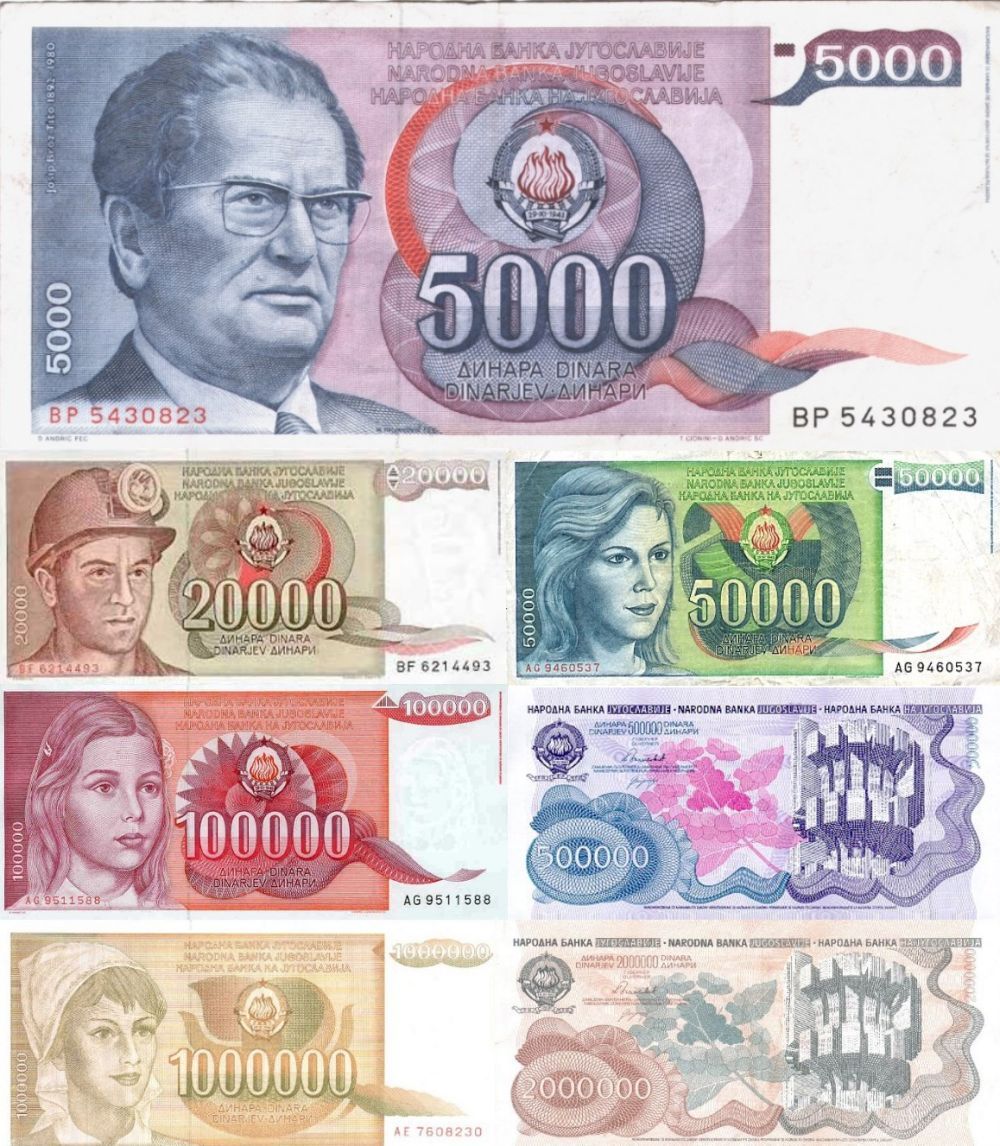
The Tito 5,000 dinar note was issued in 1985, the 20,000 bill in 1987, 50,000 in 1988, and the remaining four including the last one, the 2,000,000 dinar bill, all came out in 1989.
It seemed that money was devaluing faster than the central bank designers could draw.
The second revaluation took place on January 1st, 1990 with a new “convertible dinar” set at 10,000 : 1, basically cutting four zeros off, and from then on a whole devaluation spiral could continue.
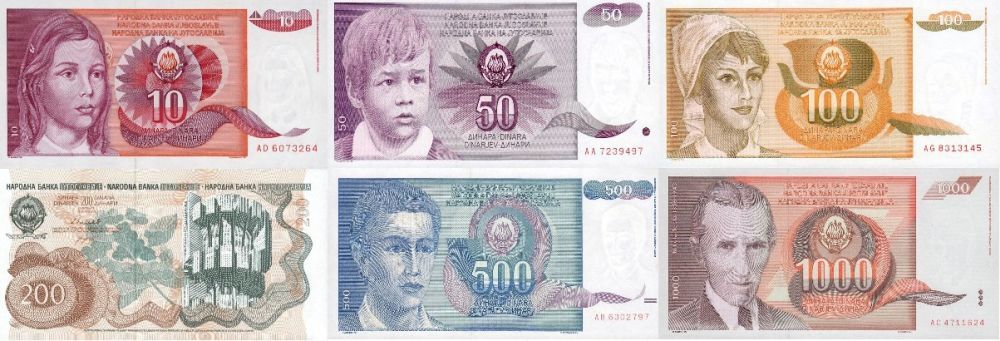
When the 5,000 bill was introduced in 1991, featuring the Yugoslavian Nobel Laureate for literature, Ivo Andrić, the country was coming to an end. This was the last dinar with writing in different languages inscribed on it, and the last one with the Socialist Federal Republic of Yugoslavia coat of arms.
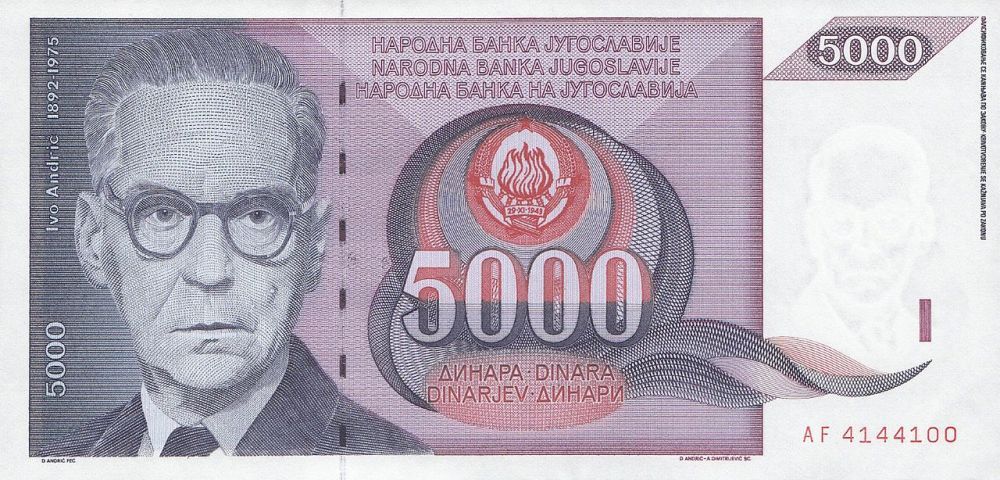
Slovenian currency, a short-lived experiment
On October 8 1991 Slovenia switched to the tolar, on December 23 Croatia introduced the Croatian dinar, on April 26 1992 Macedonia adopted the Macedonian denar, and on July 1 1992 Bosnia and Hercegovina switched to the Bosnian dinar. This was also the date of the Yugoslavian dinar’s third revaluation and the beginning of a period of massive hyperinflation, which at its peak in January 1994 amounted to 313 million % monthly inflation, meaning that prices would double every two or three days.
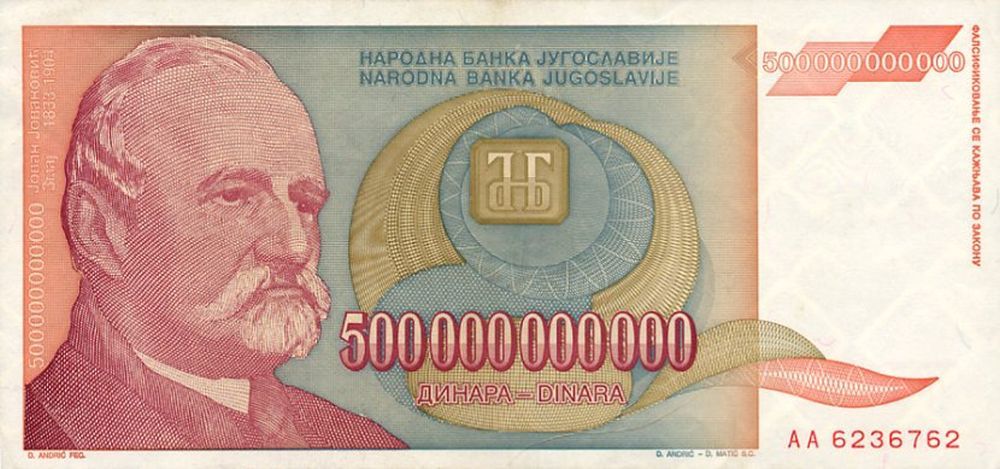
Although Slobodan Milošević blamed this monetary fiasco on sanctions imposed on what was left of Yugoslavia by the United Nations in response to Bosnian War in 1992, earlier events suggest that this time of hyperinflation might have been mostly to his own destruction of economy in his attempt at securing power. As the Federal government’s Prime Minister Ante Marković figured out as early as on January 7th 1991, the Serbian parliament secretly ordered the Serbian National Bank to issue US$1.4 billion in credit to Milošević’s friends and political supporters. This illegal plundering of the state equaled more than half of all the new money the National Bank of Yugoslavia had planned to create in 1991.
The Yugoslavian hyperinflation of 1993/94 was at the time the second highest ever recorded, until Zimbabwe pushed it to third place in 2008. The absolute winner remains the Hungarian pengő in 1946. This peaked at 1.3 x 1016 percent per month (prices double every 15 hours), and when the forint replaced the pengő in 1946, the total value of all notes in circulation in Hungary amounted to 1/1000 of one American dollar.
Keep up with the daily news in Slovenia by checking the morning headlines here
Schedule of events in the week from 29 April to 5 May 2019, as prepared by the STA:
MONDAY, 29 April
BERLIN, Germany - Prime Minister Marjan Šarec will take part in a meeting of Western Balkan leaders held at the initiative of France and Germany.
KRANJ - The annual general meeting of Gorenjska Banka will take a vote to squeeze out the remaining small shareholders following the takeover by Serbia's AIK bank.
LJUBLJANA - The two-day Global Blockchain Summit Slovenia 2019 will get under way.
TUESDAY, 30 April
LJUBLJANA - Bonfires will be lit across the country on the eve of Labour Day with the biggest event held by trade unions on Rožnik Hill above Ljubljana.
LJUBLJANA - The Statistics Office will release April inflation figures.
XI'AN China - The National Museum of Slovenia will showcase Slovenia's creativity and ancient finds at the Qujiang Museum of Fine Arts in Xi'an, until 15 November.
WEDNESDAY, 1 May
LJUBLJANA/RAVNE NA KOROŠKEM - A series of events will celebrate Labour Day, observed as a two-day public holiday in Slovenia. PM Marjan Šarec will address an event in Ravne na Koroškem (N).
WARSAW, Poland - Foreign Minister Miro Cerar will attend a celebration of the 15th anniversary of the accession of ten countries to the EU.
THURSDAY, 2 May
LJUBLJANA - Slovenia observes May Day bank holiday.
FRIDAY, 3 May
LJUBLJANA - Several Slovenian towns will join Jane's Walk 2019, a global series of urban walking tours, running until 5 May.
SATURDAY, 4 May
LJUBLJANA - The Europe Film Week will get under way, featuring free screenings of 33 European films at 12 Slovenian towns, to run until 13 June.
SUNDAY, 5 May
LJUBLJANA - Slovenia will join the Wings for Life World Run, a charity event raising money for spinal cord research.
STA, 27 April 2019 - Some 400 locals living along the border near the Jelšane border crossing with Croatia staged a rally on Saturday demanding better border protection and rejecting the idea of their community hosting a processing centre for migrants.
Those living in border areas are faced with illegal migrations on a daily basis, and migrations involve pollution of the environment, break-ins and damage to property, said Ivan Cegnar, who heads a local civil initiative that has spearheaded the protests.
"What's particularly worrying is the fear, being unable to freely move in our back yards," said Cegnar, the head of the local government council in Jelšane.
He said the locals demanded that the state protect the Schengen border in line with the law and commitments Slovenia made when it joined the Schengen zone.
Emil Rojc, the mayor of Ilirska Bistrica, said that migrations had led to a deterioration in the quality of living for the locals.
They demand that police beef up security and reject what Rojc said were "excuses" by the police that there are not enough officers to protect the border. He said Slovenia could seek assistance from the EU border agency Frontex.
If needed the army should be called up as well, said Rojc, who hails from the ranks of the Social Democrats (SD) and has raised eyebrows in his party's ranks with his hard stance on migrations.
The protest is the apex of months of mounting opposition in Ilirska Bistrica area, where many migrants chose to cross the border.
In the first three months of this year police in the western Koper District, which includes Ilirska Bistrica, registered 388 illegal border crossings, up from 266 in the same period in 2018.
The area is not the main entry point for migrants, as the vast majority cross further east covered by the Ljubljana and Novo Mesto police.
In the entire country they registered 1,639 attempts at illegal border crossing, an increase of almost 150% on the year before.
But what has further aggravated local woes around Jelšane are contingency plans that involve using buildings near the Jelšane border crossing for a processing centre for migrants in the event of a surge in migrant numbers.
The government has tried to assuage fears by emphasising that this would be a measure of last resort, but it has refused to specify at what point it may be activated.
The municipal council has even tried to stage a referendum on the registration centre, but their attempt has been thwarted by courts with the argument that such issues cannot be subject to referenda. The motion has been put to the Supreme Court.
While driven by local concerns, the protest attracted the interest of rightist parties that have made opposition to migrations a core part of their agendas.
Among the participants were senior Democrat (SDS) MP Branko Grims, the president of the far-right Homeland League (DOM) Bernard Brščič and representatives of the extremist Identitarian movement, which had in previous days urged people to attend the protest.
SDS leader Janez Janša wrote on Twitter that the protest was "the only genuine manifestation on Resistance Day," in that it was targeted "against potential conquerors and their helpers."
Meanwhile, the SD said they did not support the protest, adding in reference to the mayor coming from their ranks that "the party's competent bodies will evaluate the conduct of individual members."


